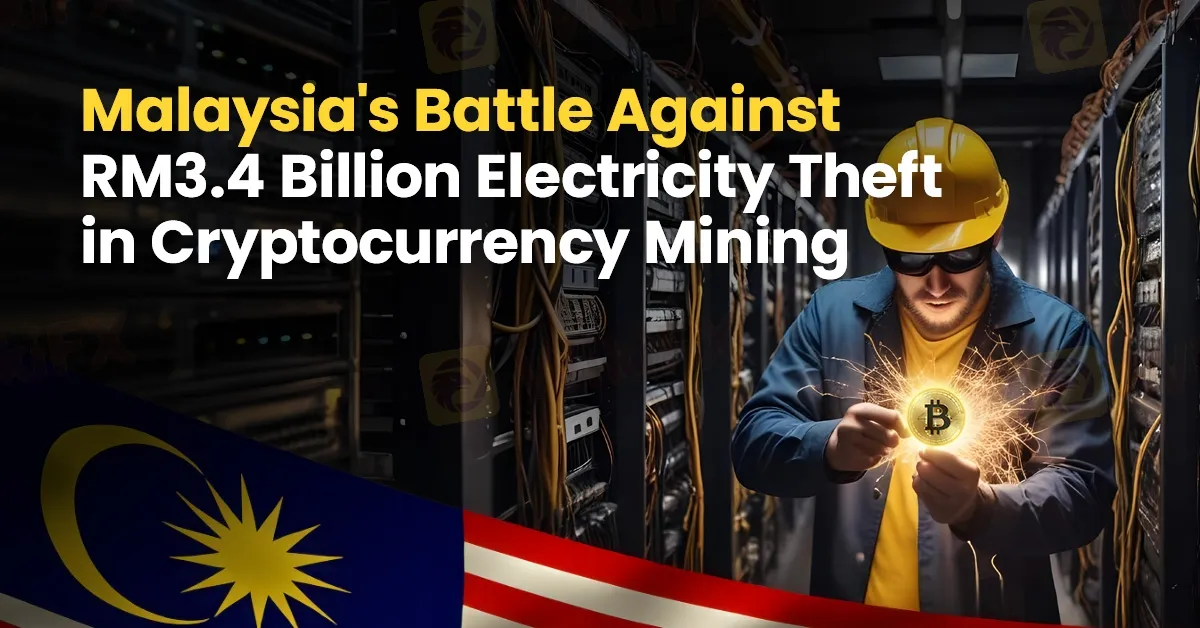简体中文
繁體中文
English
Pусский
日本語
ภาษาไทย
Tiếng Việt
Bahasa Indonesia
Español
हिन्दी
Filippiiniläinen
Français
Deutsch
Português
Türkçe
한국어
العربية
Malaysia's Battle Against RM3.4 Billion Electricity Theft in Cryptocurrency Mining
Abstract:Malaysia has faced significant financial losses, primarily due to electricity theft driven by cryptocurrency mining activities, amounting to approximately RM3.4 billion ($723 million).

Malaysia has faced significant financial losses due to electricity theft, primarily driven by cryptocurrency mining activities. According to Malaysia‘s Deputy Minister for Energy Transition, Akmal Nasrullah Mohd Nasir, the country has lost approximately RM3.4 billion ($723 million) from 2018 to 2023. This theft has posed a substantial challenge to Malaysia’s energy sector, affecting both the national power operator, Tenaga Nasional Berhad (TNB), and individual consumers.
In response to these challenges, the Malaysian government is actively working to enhance its green and renewable energy capacities. This dual approach aims to promote energy sustainability while mitigating the considerable losses attributed to illicit mining activities. Akmal Nasrullah emphasized in a local report that although cryptocurrency mining itself is legal, the unauthorized use of electricity to power these operations is illegal. To address this issue, Malaysian energy authorities have implemented various measures to monitor high energy consumption and have conducted numerous crackdowns since 2019, resulting in several arrests.
During a recent event, Akmal Nasrullah highlighted the government‘s vigorous efforts against such illegal practices. Energy companies have conducted 865 raids to investigate electricity theft cases, seizing over 2,000 items, including Bitcoin mining machines and unauthorized electrical equipment valued at around RM2.2 million ($467,000). These items were disposed of in accordance with strict legal and environmental protocols. This extensive crackdown demonstrates the government’s commitment to curbing illegal electricity usage and protecting the nations energy resources.

In addition to addressing electricity theft, Malaysia‘s Inland Revenue Board (IRB), in collaboration with police and cybersecurity experts, has launched ’Ops Token‘ to target cryptocurrency traders evading taxes. This operation led to raids on ten locations in the Klang Valley region, recovering substantial amounts of unreported profits. The initiative underscores the government’s broader strategy to regulate the cryptocurrency sector and ensure compliance with tax obligations.
The Malaysian government‘s proactive stance against electricity theft and tax evasion in the cryptocurrency sector is part of a broader effort to strengthen regulatory oversight and promote sustainable energy practices. With the rise of cryptocurrency mining in recent years, driven by the global demand for digital currencies like Bitcoin and Ethereum, Malaysia has seen a corresponding increase in energy consumption. This surge has strained the country’s electricity grid and raised concerns about the unauthorized use of electricity for mining operations.
Cryptocurrency mining involves solving complex mathematical puzzles to validate transactions on the blockchain network and earn rewards in the form of newly minted coins. This process, known as proof-of-work, requires significant computational power, which translates into high electricity consumption. In Malaysia, where electricity tariffs are relatively low compared to other countries in the region, illicit cryptocurrency mining operations have exploited this advantage, resulting in substantial losses for TNB and higher costs for consumers.
The government‘s crackdown on electricity theft associated with cryptocurrency mining is part of its broader strategy to safeguard Malaysia’s energy resources and promote sustainable development. By enforcing stricter monitoring and enforcement measures, Malaysian authorities aim to deter illegal activities and protect the integrity of the national electricity supply. These efforts are crucial not only for maintaining energy security but also for ensuring fair electricity pricing and sustainable economic growth.
In recent years, Malaysia has also ramped up efforts to expand its renewable energy capacity, aiming to reduce reliance on fossil fuels and mitigate environmental impacts. Initiatives such as the Large Scale Solar (LSS) program and incentives for renewable energy projects reflect Malaysias commitment to a greener future. By promoting renewable energy sources like solar and wind power, Malaysia seeks to diversify its energy mix and reduce carbon emissions, aligning with global climate goals.
The collaboration between government agencies, energy providers, and law enforcement in tackling electricity theft and tax evasion related to cryptocurrency mining underscores Malaysias comprehensive approach to addressing emerging challenges in the digital economy. As technology continues to evolve and digital currencies gain prominence, Malaysia remains vigilant in adapting its regulatory frameworks to ensure sustainable development and economic resilience.

Disclaimer:
The views in this article only represent the author's personal views, and do not constitute investment advice on this platform. This platform does not guarantee the accuracy, completeness and timeliness of the information in the article, and will not be liable for any loss caused by the use of or reliance on the information in the article.
Read more

Authorities Alert: MAS Impersonation Scam Hits Singapore
MAS scam alert: Scammers impersonate officials, causing $614K losses in Singapore since March 2025. Learn how to spot and avoid this impersonation scam.

Billboard Warns of Crypto Scams Using Its Name – Stay Alert!
Billboard warns against fake crypto scams using its brand. Learn how to spot fraud and protect yourself from fake promotions.

Rising WhatsApp Scams Highlight Need for Stronger User Protections
UK consumers lose £2,437 on average to WhatsApp scams. Revolut demands stricter verification and AI monitoring to combat rising fraud on Meta platforms.

How a Housewife Lost RM288,235 in a Facebook Investment Scam
A 47-year-old housewife in Malaysia recently fell victim to an online investment scam, losing a substantial sum of RM288,235 after engaging with a fraudulent scheme advertised on Facebook.
WikiFX Broker
Latest News
The Withdrawal Trap: How Scam Brokers Lure Victims into Paying More
FCA to Investors: Think Twice Before Trusting These Brokers
Trump\s tariffs: How could they affect the UK and your money
Trump gambles it all on global tariffs he\s wanted for decades
TradingView Brings Live Market Charts to Telegram Users with New Mini App
Trump tariffs: How will India navigate a world on the brink of a trade war?
Interactive Brokers Launches Forecast Contracts in Canada for Market Predictions
Authorities Alert: MAS Impersonation Scam Hits Singapore
IG Group Acquires Freetrade for £160M to Expand UK Investment Market
U.S. March ISM Manufacturing PMI Released
Currency Calculator







